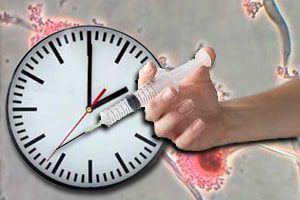
A recent study finds that early treatment is critical when fighting fungal meningitis. The study looked at one of the victims in the ongoing and growing meningitis outbreak that has been linked to tainted steroid injections produced by the New England Compounding Center (NECC). In fact, the U.S. Food & Drug Administration (FDA) said it […]
 A recent study finds that early treatment is critical when fighting fungal meningitis. The study looked at one of the victims in the ongoing and growing meningitis outbreak that has been linked to tainted steroid injections produced by the New England Compounding Center (NECC).
A recent study finds that early treatment is critical when fighting fungal meningitis. The study looked at one of the victims in the ongoing and growing meningitis outbreak that has been linked to tainted steroid injections produced by the New England Compounding Center (NECC).
In fact, the U.S. Food & Drug Administration (FDA) said it made its first confirmation of contamination with the deadly fungus in one of the three lots of the steroids linked to the nationwide fungal meningitis outbreak, said The Chicago Tribune. As of the most current figures, 20 people have died in the multi-state outbreak. And, in addition to 254 reported cases of fungal meningitis, stroke a result of presumed fungal meningitis, or other central nervous system-related infections, three additional cases involve peripheral joint infections—knee, hip, shoulder, elbow. No deaths have been linked to joint infections, the U.S. Centers of Disease Control and Prevention (CDC) said.
Of the nine newly reported cases—which include one new fatality—said The Chicago Tribune, the first case in New York was reported, making the state the 16 with confirmed fungal meningitis infections. The New York case was reported in a Nassau County, Long Island resident who became infected with a non-life-threatening joint infection, said The Public. Locations in Mineola, Mount Vernon, and Rochester, New York, received shipments of the steroids linked to this outbreak; 425 patients in New York received the steroid injection, said health officials.
Meanwhile, doctors at the Johns Hopkins School of Medicine in Baltimore, Maryland said that early diagnosis and treatment of those patients who are at risk of developing fungal meningitis is critical, said Reuters. The team based its conclusion on a case involving a previously healthy woman who suffered a rapid decline following injection with the NECC injection for neck pain. The woman died ten days after she was admitted to the hospital, on the same day Exserohilum was detected in her spinal fluid. According to Reuters, her autopsy revealed significant tissue death in her brain stem, evidence that she suffered a stroke, and inflammation in her blood vessels.
The researchers wrote in this week’s Annals of Internal Medicine that the 51-year-old woman suffered a rapid deterioration following emergency room treatment for a severe headache she suffered one week after receiving the tainted injection on August 31, said Reuters.
The outbreak has been linked to tainted vials of injectable steroid methylprednisolone acetate made by the NECC and most cases have been linked to Exserohilum, a fungus seen in grass and rotting wood; Exseohilum is known to be very aggressive in how it attacks spine and brain stem tissue, said Reuters. While fungal infections attack people with significantly compromised immune systems, the woman involved in this case had no medical history of a compromised immune system, was not taking any medications on a long-term basis, and had only received one injection, noted Reuters.
When she first spoke to doctors about her symptoms, she was told that nothing wrong was found and she was sent home; she returned the next day with worsened symptoms and was hospitalized. Her doctors attempted a number of antibiotics and other medications; however, her condition continued to degrade, said Reuters. A wide array of tests—including for herpes simplex virus, varicella zoster virus (which causes chicken pox and shingles), Epstein-Barr virus, cytomegalovirus, West Nile virus, and cryptococcal fungi (a known cause of fungal meningitis—were conducted and came back negative.
The researchers urge physicians to be diligent in the prevention of “serious complications and deaths,” according to Reuters. Symptoms of fungal meningitis include new or worsening headache, fever, sensitivity to light, stiff neck, weakness or numbness in any body part, slurred speech, increased pain, and injection site redness or swelling.


